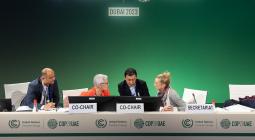The US and Saudi Arabia are taking COP28 pledges seriously
The US and Saudi Arabia have reduced investment in oil and gas supply, putting consuming countries in front of their responsibilities by forcing them to act and deliver on their COP28 pledges,
Assuming COP28 pledges to limit global warming are met, both the energy and climate crises would be solved.
According to the UN summit’s pled on renewables and energy efficiency, adopted last December in Dubai, “to limit warming to 1.5°C, the world requires three times more renewable energy capacity by 2030, and must double the global average annual rate of energy efficiency improvements from around 2% to over 4% every year until 2030”.
But meeting these objectives will be a tall order.
First, let’s make it clear that, contrary to the Dubai pledge, energy efficiency (as measured by unit of energy per $ of GDP) was not equal to 2% of compound annual growth rate in 2012-2022 but only equal to 1.5%.
Secondly, if anything, energy efficiency improvement has decreased massively since the 1970s
Thirdly, it’s important to emphasise that the world’s primary energy consumption has grown by 1.4% per annum in the last decade.
If by some magical technology we are able to multiply by 2 the global average annual rate of energy efficiency, then this alone would allow, for the first time in history, to stop needing more primary energy on a global level, and even to witness a 0.6% annual decline between 2022 and 2035.
If we then assume that renewables can be multiplied by 3, this would mean that coal can be fully removed from the world mix before 2035.
This hypothesis looks “osé” at best and, more likely, totally unachievable.
With a business-as-usual scenario of 1.4% annual growth for primary energy, if renewable achieves its pledge, oil and coal demand stays flat and gas production needs to increase by only 1% per annum.
Finally, if both pledges are fantasy, then the world will continue to need more coal, oil and gas.
On 26 January, US President Biden paused non-FTA authorisation for US LNG exports. This was followed on 30 January by Saudi Aramco abandoning a plan to boost its oil output capacity.
This could be viewed as major oil and gas producers having doubts about future demand.
But more importantly, with reduced investment in oil and gas supply, these two decisions now force consuming countries to act and deliver on their COP28 pledges.
And whatever the outcome, major producers win as they commit reduced capital expenditure now and could get a boost in prices later if consumers cannot achieve their COP28 pledges.
Can consumers deliver on COP28 pledges?
So far, pledges made at COP meetings have had little consequences, as energy consumption and CO2 emissions have both continued to grow.
The US and Saudi Arabia are therefore putting consumers in front of their responsibilities: either deliver or stop the ongoing COP circus.
Interestingly, it didn’t take long for major consumers like the EU and Japan to complain to the US as they realised that, perhaps, reality might be different than the magic math behind the pledges.
If EU fails, it will, as done since 2022, reroute available LNG cargos at premium prices and pushes Asia back into more coal. Effectively, this means the overly optimistic COP28 scenario could translate, as seen in all previous COPs, in coal increase.
China and India, respectively first and second producers of coal worldwide, are ready to step up production if needed. And Russia could have a geopolitical interest in boosting its own coal exports to the Global South as it sits on the second largest reserves in the world.
Next year, with coal consumption reaching new records and CO2 emissions still not on track, we could see Western political leaders blaming the International Energy Agency (IEA) for wrongly forecasting a green energy world that is out of reach for consumers with limited budget. This backlash could be similar to what we saw last week when EU farmers and several EU leaders blamed the European Commission for its dogmatic “Farm to Fork” program.
The US and Saudi Arabia just played a nice trick by not only promoting a “green” agenda but, most importantly, by pushing the EU and IEA to either deliver or stop setting impossible targets.
Cover photo: On 26 January, US President Biden paused non-FTA authorisation for US LNG exports followed on 30 January, by Saudi Aramco abandoning a plan to boost its oil output capacity. [Photo credit: Hamara / shutterstock.com]





